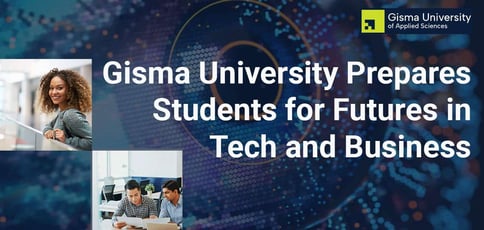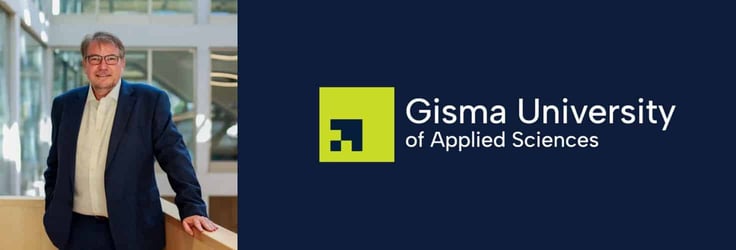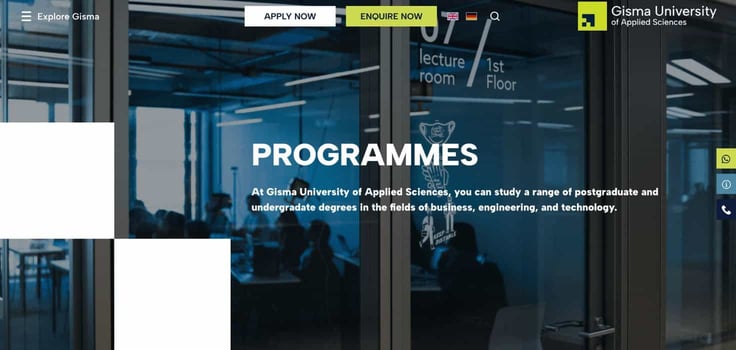
TL; DR: Contrary to recent high-profile layoffs, tech jobs are still in high demand and don’t seem to be slowing down any time soon. According to CNBC, demand for software developers is outpacing its average 5% growth rate. Digital transformation has been the main catalyst. Companies will always need tech employees to help with emerging technologies. This is where Gisma University steps in. The university helps prepare students for futures in tech with in-demand curriculum, networking opportunities, and career resources. We spoke with Professor Dr. Stefan Stein, President of Gisma University, about the university and its unique international program.
It’s no secret that technology jobs are in demand. As new technologies emerge, companies are on the hunt to find talent to help manage adoption and spearhead new solutions for their markets. This isn’t happening in a vacuum. Digital transformation is worldwide. Countries around the world are working to keep pace. That work starts in the classroom.
If businesses want to keep up with digital transformation, which is accelerating at a high rate and waiting for no one, they will need all the help they can get. Training the next generation of critical thinkers will surely help them move in the right direction. This is why more schools across the globe are adding technology programs to their degree options.
Gisma University is one of many institutions moving to add more computer science programs for its students. Located in Potsdam, Germany, Gimsa was primarily a business school before the board decided to include tech programs in response to high demand for tech jobs in the area.

“We now have a portfolio of seven programs in the broader field of computer science. It is quite unusual, I would say, for a university that started as a business school. Already 40% of our entire student body is enrolled in tech-related study programs,” said Professor Dr. Stefan Stein, President of Gisma University.
Gisma’s most popular study programs are data science and artificial intelligence, two career fields that are currently in high demand. Students, international and domestic, can enroll at Gisma to find the resources and education they need to break into their industries, whether for tech, business, or both.
Teaching Students In-Demand Skills and Technologies
Although Gisma has ventured into tech, business remains a focus at the university. Prof. Stein referred to business as the university’s DNA and said that all of Gisma’s curriculum is interconnected. Nothing exists out of the other. Learning tech skills can serve business students while business education can prepare students for when they enter the workforce.
“When you think about the job requirements of the future, everyone will need digital literacy. So the curricula are not standing as isolated pillars but we really seek a connection and a link between them,” said Prof. Stein.
Business and tech have become increasingly interlinked. We can see that in marketing, as data science has become a prominent tool in assessing consumer behavior. Gisma’s programs also reflect the same trends. The university has undergraduate and graduate options that combine data science, AI, and digital business to give students a full scope of study.

“These two programs on bachelor level and master level have the highest demand. Now for the first time ever, we are even offering engineering degrees. One is a Master of Engineering in computer science and the other one is a Bachelor of Engineering in software engineering,” said Prof. Stein.
Gisma is all about keeping up with modern technology. The university already has plans to introduce generative AI into its curriculum. Prof. Stein said this is one of the most important initiatives for the staff. They have launched isolated pilot projects, which allows students to have proactive experiences with generative AI.
“We provide this experience because we believe in the future it will be very normal for students to work with AI. When you study data science and AI, you expect to interact with AI. But we want to implement AI on a broader basis, for both computer science and business students,” said Prof. Stein.
Providing Opportunities to Foster Business and Community Connections
Curriculum is not the only focus at Gisma University. The staff also helps students learn and hone their skills through extracurricular activities and networking opportunities. Gisma’s dedicated career center is the perfect solution for ambitious students. Prof. Stein said although the school doesn’t have a job placement program, it does have its own networking portal.
“What we do is bring companies here in different formats. Our most important format is what we call Gisma Skills Sprint Week. This is a one-week format dedicated to practical skills and bringing companies on campus in direct contact with our students,” said Prof. Stein.
Prof. Stein said Gisma Skills Sprint Week can focus on a variety of different approaches. It could be case studies, hackathons, expert talks, keynote appearances, or company visits. Big-name companies have already visited Gisma in the past. Mercedes has an engine manufacturing site outside of Potsdam, where the university is located, and it recently came to the campus.
“They were seeking advice on how to optimize the flow of their production process. They wanted to acquire two teams. But after hearing the proposals from the students, they decided to invite four teams for another competition on site at Mercedes,” said Prof. Stein.
Gisma is in a prime location for networking opportunities. Located about 20 miles from Berlin, it is at the intersection of a social, cultural, and economic hotspot. Prof. Stein said there is a lot of activity taking place nearby, including a SAP global innovation center, an exploding startup scene, and the Federal Parliament.
“We’re not only bringing them closer to different NGOs who offer opportunities to participate and engage but also politically we allow them to have discussions about topics impacting them. We recently had a visit from our German chancellor and he had direct conversations with our alumni on AI and other topics,” said Prof. Stein.
An International Program Ripened With Resources
Another quality that sets Gisma apart from other universities is its dedication to international students. The university provides a variety of programs and resources to interested students. Prof. Stein said many of its programs are much shorter than those in other countries, helping students enter the job market faster. Besides this structural component, Gisma also has a diverse faculty to help international students adjust along the way.
“It is not only our student body with different nationalities, but it is also our colleagues. So we have ensured that the professors and tutors know the requirements of international students,” said Prof. Stein.
Prof. Stein said this is important for Gisma because every country has its own learning styles and the staff needs all their students on the same page. Diverse faculty members are best suited to help these students adapt. Gisma also streamlines the entire student journey. It provides resources and services for multiple application steps, including a dedicated visa service.
“We figured that there was a huge demand to guide the students through the registration process. So we invited an external immigration lawyer to give our students advice, allowing them individual time to ask questions and make the experience as smooth as possible to come study with us,” said Prof. Stein.
In addition, Gisma has global classes to allow students from other countries to participate and learn while they wait for their visas. Gisma covers all the bases. As for the future, the university plans to expand and open a new campus in Berlin soon to reach more students and raise the next generation of scientists and changemakers.
“I like to say that education is a treasure for the students, a breeding ground for creativity and innovation. But these days, it is also our measure to foster better mutual understanding between each other. And that is something Gisma supports,” said Prof. Stein.


